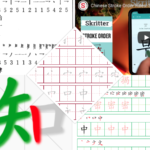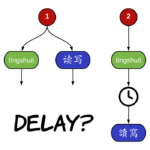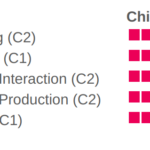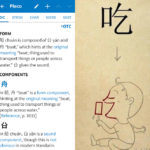Articles in the ‘Writing’ category Page 4
-
Chinese input methods: A guide for second language learners
There are many different input methods available for Chinese characters, including phonetic typing, non-phonetic typing, handwriting and speech recognition, but which method is best for people who study Chinese? And why?
Read → -
20 tips and tricks to improve your Chinese writing ability
Writing is one of the four basic language skills, and one that learners of Chinese struggle with a lot. Good writing is based on lots of reading, but beyond that, there are plenty of other things you can do to improve your writing ability in Chinese beyond the characters themselves. Here are twenty tips and tricks!
Read → -
Are simplified characters really simpler to learn?
Are simplified characters easier to learn? They have fewer strokes, but quicker to write doesn’t necessarily mean easier to learn! The simplified vs. traditional characters debate has been going on for a long time, mostly based on emotion. In this guest article, Ash Henson from Outlier Linguistics strives to add reason to the mix and answer the question of whether simplified characters are actually simpler to learn.
Read → -
All the resources you need to learn and teach Chinese stroke order
Stroke order for Chinese characters is something most beginners struggle with to begin with, but it’s also a problem that quickly fades away over time. This article collects all the resources you need to understand stroke order, look it up when you need to, and provides you with the practice you need.
Read → -
Diversify how you study Chinese to learn more
How is it possible to spend 80 hours a week learning Chinese? And what can you learn from that, even if you find it hard to find any time to study whatsoever, with work and family taking up most of your time? This article aims at widening the scope of what it means to learn Chinese, and shows you ways you can learn that you probably haven’t thought of before!
Read → -
Training your Chinese teacher, part 4: Writing ability
Writing ability is largely determined by how much you read, but there are many areas where a teacher can help you through valuable feedback. This article looks at this process, discussing what activities to engage in and what role your teacher can play.
Read → -
Should you learn to speak Chinese before you learn Chinese characters?
The question of whether or not to delay learning Chinese characters in favour of the spoken language is an interesting one many arguments in favour of both approaches. For most people setting out on their Chinese learning journey, focusing on important aspects of the spoken language, such as pronunciation, is certainly more important than learning characters.
Read → -
How to get honest feedback to boost your Chinese speaking and writing
Feedback is important because it can show you how to not use the language and highlight things you hadn’t noticed before. But getting honest feedback when learning Chinese is not as easy as it seems. This article starts by looking at why feedback is necessary, and continues by discussing how to get honest feedback.
Read → -
How to figure out how good your Chinese is
Figuring out how good your Chinese is can help you focus on the right areas and evaluate your learning methods. But language assessment is hard! This article describes how and why you should assess how good your Chinese is, and gives you tools and resources to do so.
Read → -
5 levels of understanding Chinese characters: Superficial forms to deep structure
How much do you need to care about the actual composition and meaning of a Chinese character when learning it? In general, better understanding means it’s easier to learn, but is there a limit to how closely you should stick to actual etymology? This article explores the spectrum from using superficial images to real etymology from the perspective of a language learner.
Read →









